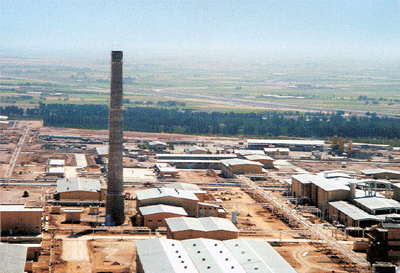
Where the magic happens: Uranium Conversion Facility at Isfahan.
Dr. Arms Control Wonk will attenting the fourth NPRI symposium, Full Spectrum Dominance: The Impending Weaponization of Space, at Airlie House in Warrenton, Virginia today and tomorrow.
During this period, Iran and the EU3 will meet in what Iranian Foreign Ministry spokesman called a “last chance” to salvage negotiations.
The meeting was scheduled after the EU3 rejected Iran’s 29 April proposal in London and Iran announced its intention to resume conversion of uranium tetrafluoride (UF4) into uranium hexafoluoride (UF6).
At issue is a fundamental disagreement about the basic bargain in any final agreement. Are negotiations about finding a confidence building regime to allow Iran to enrich uranium or the incentives to entice Iran to abandon plans for a full nuclear fuel cycle?
Will either party blink? Hans Blix hints Tehran could accept a permanent moratorium on enrichment related activities, while Fred Kaplan urges Europe to stand firm.
Iran, however, looks ready to stand fast. Although Iran has delayed the resumption of enrichment-related activities, Reuters reports Naseri has a letter that will announce Iran’s intention to “break U.N. seals and restart parts of its nuclear fuel program.” The Iranian parliament passed a non-binding bill urging the government to resume work.
The Europeans, on the other hand, may split over a limited Iranian enrichment program under tight IAEA monitoring:
European diplomats close to the talks have said some French officials would be willing to allow the Iranians a limited enrichment program that would be closely monitored by the U.N. International Atomic Energy Agency (IAEA). But Germany does not like the idea and Britain categorically rejects it, they said.
If neither party backs down, Washington and the EU3 will have to decide whether to bring the matter before the UN Security Council. Even then, Iran might escape any punishment in the Security Council, where Russia or China might veto any resolution. UN Secretary-General Kofi Annan reportedly predicted this outcome in an interview with USA TODAY.

I’m glad to see some analysis of what would be likely to happen if the issue of Iran’s nuclear program was brought before the UN Security Council.
I think it’s a crucial question. I’ve read many stories on the Iran situation which say that the matter may have to be “referred to the UNSC” under certain circumstances. However, absent further analysis, that phrase is almost meaningless. What it means, in practical terms, for a matter to be “referred to the UNSC” depends entirely on the likely outcomes of such a referral.
Great analysis, as Mr. Postman mentions above. I noticed an article in Sunday’s New York Times on the matter of increased support for the use of nuclear energy in the United States. What (if anything) would be the implications for the global oversight of nuclear weaponization if the energy uses that often mask it become more commonplace?